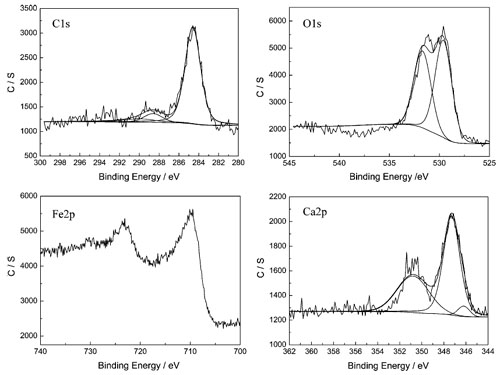
XPS spectra of elements on worn surface lubricated by 5 wt.% CaCO3/lithium grease at 300 N for 30 min
During the last few years, nanomaterials have attracted great attention in various research fields because of their special physical and chemical properties. In tribology, some nanomaterials were added into lubricating oil/grease to improve extreme pressure, anti-wear and friction-reduction properties. In particular, the tribological properties of metals, metal oxides, metal sulphides, rare earth compounds, and borides used as lubricating additives have been investigated. Unfortunately, most of reported nanomaterials either contain sulphur, phosphorus atoms or involve heavy metals, which is a potential threat to environment. Therefore, green additives have received more attention recently, such as calcium carbonate.
Researchers from the State Key Laboratory of Solid Lubrication of the Lanzhou Institute of Chemical Physics have synthesized CaCO3 nanoparticles with an average size of 45 nm via the carbonation method and investigated their tribological properties as an additive in lithium grease.
Results show that CaCO3 nanoparticles as an additive in lithium grease significantly improve its anti-wear performance, friction-reduction property, load-carrying capacity, and extreme pressure property. The optimum concentration is 5 wt.%. During the friction process, CaCO3 nanoparticles were deposited on the rubbing surfaces forming a boundary film. A complicated tribochemical reaction also occurred in the boundary lubrication process. From XPS and EDS analysis of the corresponding worn steel surface, it can be seen that the boundary film was composed of CaCO3 nanoparticles, CaO, iron oxide, and other organic compounds.
The work has been financially supported by the National Program on Key Basic Research Project of China, National High-tech R&D Program of China and National Natural Science Foundation of China. The findings have been published in Tribol Lett (Tribol Lett (2011) 41:113–119).
Tribol LettPaper
